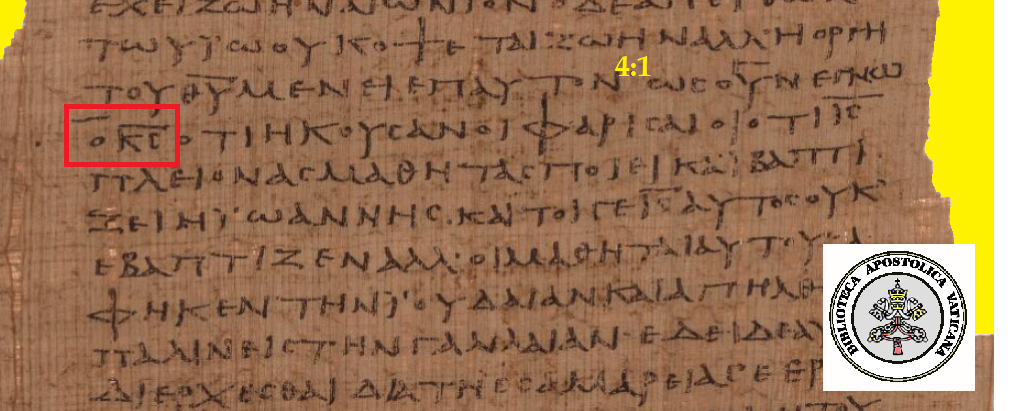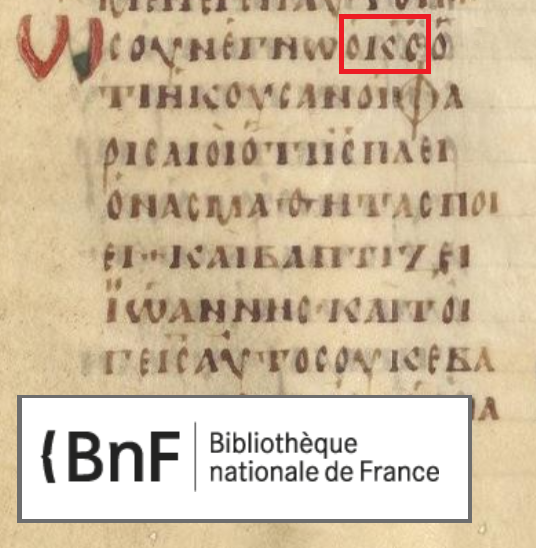From James Snapp's website THE TEXT OF THE GOSPELS
The Text of the Gospels: John 4:1 - "Jesus" or "The Lord"?
Sunday, September 8, 2024

Papyrus 75
At the beginning of the fourth chapter of the Gospel of John readers of modern Bibles encounter a minor deviation from the usual text: The Byzantine text reads “When therefore the Lord knew how the Pharisees had heard that Jesus made and baptized more disciples than John.” Agreeing with the Byzantine text are versions such as the KJV, MEV, NKJV, and RSV. The Tyndale House GNT, echoing Tregelles, also has “ὁ κύριος,” as did Scholz’s 1836 compilation, Nestle’s Greek New Testament in 1899, and Nestle’s 1948 Novum Testamentum Graece. The 1881 compilation by Westcott and Hort also read ὁ κύριος.
In the Evangelical Heritage Version, the English Standard Version, the Christian Standard Bible, the Contemporary English Version, the Holman Christian Standard Bible, the Legacy Standard Bible, the NET, New International Version, the NRSV, and the New Living Translation, “Jesus” fills the place where “the Lord” appears near the beginning of the verse.

Codex 032 (W supplement)
Have the ESV, NIV, NRSV, and NLT rejected the reading in the majority of manuscripts in order to conform to the earliest manuscripts? No! Although Papyrus 66* and Codex Sinaiticus, 05, 038, 039, 086 (a Greek-Coptic fragment that contains John 1:23-26, 3:5-4:18, 4:23-35, and 4:45-49, assigned to the 500s) and f1 support Ἰησοῦς, Papyrus 66c, Papyrus 75, and Vaticanus support ὁ κύριος, as do A C L Wsupp 044 083 0141 33 700 892 etc. You read that right: the reading in the Byzantine text has earlier manuscript support than its rival
Versional evidence is quite divided. The Vulgate, the Peshitta, the Harklean Syriac, the Bohairic, the Fayummic, and most Old Latin copies support Ἰησοῦς. The Armenian and Georgian versions diverge: the Armenian version supports Ἰησοῦς but the Georgian version supports ὁ κύριος. The Sinaitic Syriac supports ὁ κύριος and the Curetonian Syriac supports Ἰησοῦς – and so does the Sahidic version, the margin of the Harklean Syriac, and one Bohairic copy.

Codex Regius (L, 019)
Ἰησους is read by Epiphanius and Chrysostom, whereas Cyril supports ὁ κύριος. Augustine is inconsistent, supporting Ἰησους in three out of four cases but ὁ κύριος once.
The NET has a relatively long note arguing for Ἰησοῦς, but the annotator’s argument is somewhat presumptive: the “immediate context” is simply asserted to outweigh John’s style, and Ἰησοῦς is simply asserted to be “the harder reading.” There really is no reason to regard either Ἰησοῦς or ὁ κύριος as the harder reading expect the observation that Ἰησοῦς occurs later in the verse – so the adoption of Ἰησοῦς yields a slightly odd-sounding verse: “Therefore when Jesus knew that the Pharisees had heard that Jesus was making and baptizing more disciples than John.”
The scribe of Codex 039 (Λ) may have felt that the second occurrence of Ἰησοῦς seemed jarring; he left out the second Ἰησοῦς from the text. Likewise in modern times only one occurrence of “Jesus” is in John 4:1 in the English versions CSB, CEV, EHV, HCSB, NET, NIV, NLT, although in the Greek base-text of these versions Ἰησοῦς appears twice. In my opinion this shows the translators’ reluctance to have the word “Jesus” appear twice in close proximity – although that was done in the Rheims version, ESV, LSB, and NRSV
Bruce Terry, in defense of the reading Ἰησοῦς, has offered the theory that “Since “Jesus” occurs twice in the following clauses, copyists were more likely to change “Jesus” to “the Lord” to improve the style than visa versa.” The UBS committee was divided (favoring Ἰησους with a C grade) but Metzger stated that Ἰησοῦς was preferred on the grounds that “it is unlikely that a scribe would have displaced it [ὁ κύριος] with Ἰησοῦς.” That is more of an assertion than an argument.
A better explanation is that early scribes in the Western transmission-line anticipated that readers would be confused by the vagueness of “ὁ κύριος” – which could refer to the Father as well as to the Son – and decided to make the text more specific. This was adopted in part of the Alexandrian transmission-line. Considering that support for ὁ κύριος comes not only from the vast majority of witnesses but also from multiple transmission-lines and from very early witnesses, and that Ἰησοῦς is supported by early Western witnesses in which exchanges from less specificity to more specificity is typical, the reading Ἰησοῦς should be rejected in favor of the less specific reading
The Text of the Gospels: John 4:1 - "Jesus" or "The Lord"?
The Text of the Gospels: John 4:1 - "Jesus" or "The Lord"?
Sunday, September 8, 2024

Papyrus 75
At the beginning of the fourth chapter of the Gospel of John readers of modern Bibles encounter a minor deviation from the usual text: The Byzantine text reads “When therefore the Lord knew how the Pharisees had heard that Jesus made and baptized more disciples than John.” Agreeing with the Byzantine text are versions such as the KJV, MEV, NKJV, and RSV. The Tyndale House GNT, echoing Tregelles, also has “ὁ κύριος,” as did Scholz’s 1836 compilation, Nestle’s Greek New Testament in 1899, and Nestle’s 1948 Novum Testamentum Graece. The 1881 compilation by Westcott and Hort also read ὁ κύριος.
In the Evangelical Heritage Version, the English Standard Version, the Christian Standard Bible, the Contemporary English Version, the Holman Christian Standard Bible, the Legacy Standard Bible, the NET, New International Version, the NRSV, and the New Living Translation, “Jesus” fills the place where “the Lord” appears near the beginning of the verse.

Codex 032 (W supplement)
Have the ESV, NIV, NRSV, and NLT rejected the reading in the majority of manuscripts in order to conform to the earliest manuscripts? No! Although Papyrus 66* and Codex Sinaiticus, 05, 038, 039, 086 (a Greek-Coptic fragment that contains John 1:23-26, 3:5-4:18, 4:23-35, and 4:45-49, assigned to the 500s) and f1 support Ἰησοῦς, Papyrus 66c, Papyrus 75, and Vaticanus support ὁ κύριος, as do A C L Wsupp 044 083 0141 33 700 892 etc. You read that right: the reading in the Byzantine text has earlier manuscript support than its rival
Versional evidence is quite divided. The Vulgate, the Peshitta, the Harklean Syriac, the Bohairic, the Fayummic, and most Old Latin copies support Ἰησοῦς. The Armenian and Georgian versions diverge: the Armenian version supports Ἰησοῦς but the Georgian version supports ὁ κύριος. The Sinaitic Syriac supports ὁ κύριος and the Curetonian Syriac supports Ἰησοῦς – and so does the Sahidic version, the margin of the Harklean Syriac, and one Bohairic copy.

Codex Regius (L, 019)
Ἰησους is read by Epiphanius and Chrysostom, whereas Cyril supports ὁ κύριος. Augustine is inconsistent, supporting Ἰησους in three out of four cases but ὁ κύριος once.
The NET has a relatively long note arguing for Ἰησοῦς, but the annotator’s argument is somewhat presumptive: the “immediate context” is simply asserted to outweigh John’s style, and Ἰησοῦς is simply asserted to be “the harder reading.” There really is no reason to regard either Ἰησοῦς or ὁ κύριος as the harder reading expect the observation that Ἰησοῦς occurs later in the verse – so the adoption of Ἰησοῦς yields a slightly odd-sounding verse: “Therefore when Jesus knew that the Pharisees had heard that Jesus was making and baptizing more disciples than John.”
The scribe of Codex 039 (Λ) may have felt that the second occurrence of Ἰησοῦς seemed jarring; he left out the second Ἰησοῦς from the text. Likewise in modern times only one occurrence of “Jesus” is in John 4:1 in the English versions CSB, CEV, EHV, HCSB, NET, NIV, NLT, although in the Greek base-text of these versions Ἰησοῦς appears twice. In my opinion this shows the translators’ reluctance to have the word “Jesus” appear twice in close proximity – although that was done in the Rheims version, ESV, LSB, and NRSV
Bruce Terry, in defense of the reading Ἰησοῦς, has offered the theory that “Since “Jesus” occurs twice in the following clauses, copyists were more likely to change “Jesus” to “the Lord” to improve the style than visa versa.” The UBS committee was divided (favoring Ἰησους with a C grade) but Metzger stated that Ἰησοῦς was preferred on the grounds that “it is unlikely that a scribe would have displaced it [ὁ κύριος] with Ἰησοῦς.” That is more of an assertion than an argument.
A better explanation is that early scribes in the Western transmission-line anticipated that readers would be confused by the vagueness of “ὁ κύριος” – which could refer to the Father as well as to the Son – and decided to make the text more specific. This was adopted in part of the Alexandrian transmission-line. Considering that support for ὁ κύριος comes not only from the vast majority of witnesses but also from multiple transmission-lines and from very early witnesses, and that Ἰησοῦς is supported by early Western witnesses in which exchanges from less specificity to more specificity is typical, the reading Ἰησοῦς should be rejected in favor of the less specific reading
The Text of the Gospels: John 4:1 - "Jesus" or "The Lord"?
